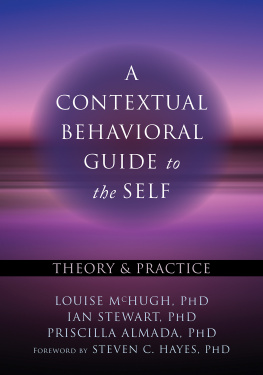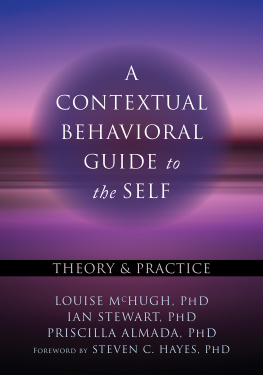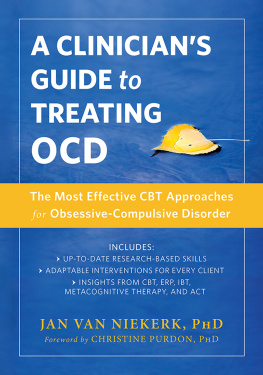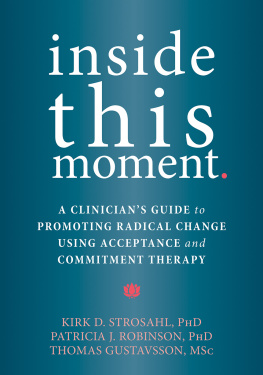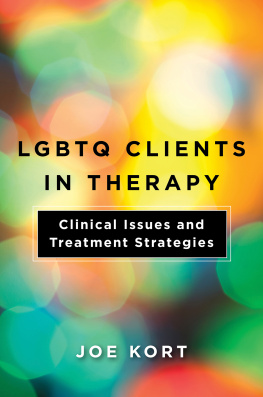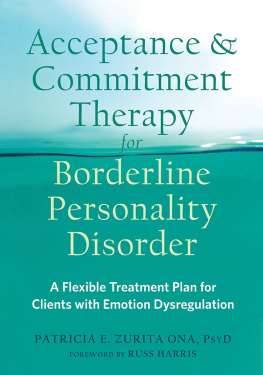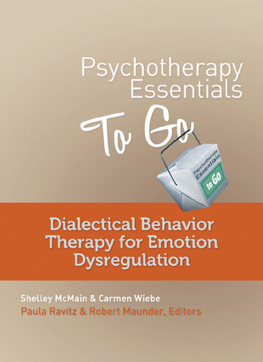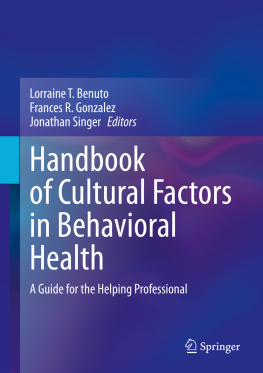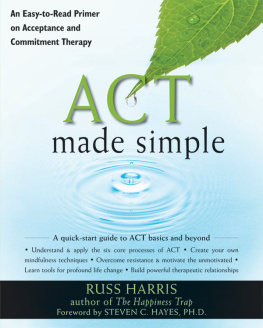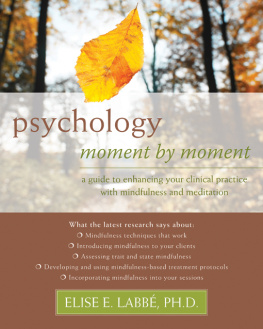It is rare to find a good book on the self, much less any book on the self, that provides a crystal clear picture of what we mean by the self. A Contextual Behavioral Guide to the Self creates a marvelous balance between cutting-edge science and practical clinical applications to help the practicing clinician effectively intervene with a variety of self-related problems. The writing is exceptionally clear and the clinical examples make important points seem easy to grasp. Getting a handle on what exactly we mean by self and how to work to improve self-related functioning has been a serious, long-term challenge in clinical psychology. This book moves us forward in a major way. Highly recommended!
Kirk Strosahl, PhD , cofounder of acceptance and commitment therapy (ACT), and coauthor of Inside This Moment
A Contextual Behavioral Guide to the Self is a gold mine of information that can empower both your knowledge and your practice. The book is a masterful guide to some of our most advanced research on self experience. I would recommend this to anyone seeking to deepen their ACT practice, or their understanding of what it is to be human and to have a self.
Dennis Tirch, PhD , founder of The Center for Compassion Focused Therapy, associate clinical professor at Mount Sinai, and coauthor of The ACT Practitioners Guide to the Science of Compassion
This is a truly remarkable book. The authors use their thorough knowledge of the complex phenomenon of the self, and work themselves all the way from basic science up to practical, clinical recommendations for psychological treatment. An important read for researchers and clinicians alike.
Niklas Trneke, MD , author of Learning RFT and Metaphor in Practice
Few books are able to bring theory to life as well as A Contextual Behavioral Guide to the Self . The authors take us on a fascinating journey to discovering the selfhow it develops, how it can lead to psychological suffering, and how to turn it into a source of well-being and growth. Read this book to discover a number of innovative, practical tools and new ways to conceptualize the self with cutting-edge relational frame theory (RFT) research.
Matthieu Villatte, PhD , assistant professor in the department of counseling and health psychology at Bastyr University, and coauthor of Mastering the Clinical Conversation
This excellent book offers an insightful, cutting-edge look at the concept of self. Youll learn about our different senses of self, how these selves develop, what can go wrong with these processes, and what we can do about it therapeutically. Theres a gold mine of clinically useful material in here, to help both you and your clients. If youve ever struggled to understand complex ACT concepts such as self-as-context and self-as-process (and lets face it, havent we all?) this book will set you straight. An essential addition to the library of all contextual behavioral practitioners.
Russ Harris , author of The Happiness Trap and ACT Made Simple
All of us working with people know that psychological challenges are fundamentally issues of self. Traditionally, behaviorismunlike other branches of psychotherapyhas had no room for a self concept. In contrast, this unique bookbased in behavioral analysis and RFTplaces the self up front and center stage. The authors show you clearly, in a scientific and practical framework, how and why the self matters. The underpinning is functional contextualism or contextual behavioral psychology. As you read this book you will understand how the self is created and maintained based on RFT. You will learn a new word, selfing, which describes how we verbally respond to our own responding. The authors illustrate what is needed for healthy selfing, and what types of problems and issues may occur. Readers will find generous portions of tips on how to measure, evaluate, and treat problems with selfing. This book is solidly based in RFT research, but it offers a great, practical approach that I am certain all of us who serve people will find useful.
JoAnne Dahl, PhD , professor in the department of psychology at Uppsala University in Uppsala, Sweden; licensed psychologist; psychotherapist; peer-reviewed ACT trainer; and Association for Contextual Behavioral Science fellow
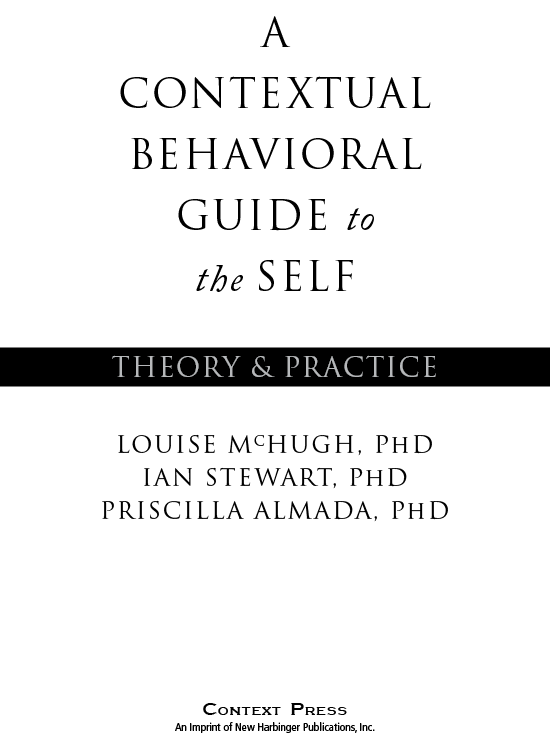
Publishers Note
This publication is designed to provide accurate and authoritative information in regard to the subject matter covered. It is sold with the understanding that the publisher is not engaged in rendering psychological, financial, legal, or other professional services. If expert assistance or counseling is needed, the services of a competent professional should be sought.
Distributed in Canada by Raincoast Books
Copyright 2019 by Louise McHugh, Ian Stewart, and Priscilla Almada
Context Press
An imprint of New Harbinger Publications, Inc.
5674 Shattuck Avenue
Oakland, CA 94609
www.newharbinger.com
Cover design by Amy Shoup
Acquired by Jennye Garibaldi
Edited by Xavier Callahan
Indexed by James Minkin
All Rights Reserved
Library of Congress Cataloging-in-Publication Data on file
Contents
Acknowledgments
The authors would like to warmly thank Robyn Walser, Niklas Trneke, Russ Harris, Matthieu Villatte, and Emily Sandoz for their feedback and comments on earlier versions of the manuscript. We would also like to thank the editorial and production teams from New Harbinger for all their work on bringing this book to fruition: Camille Hayes, Tesilya Hanauer, Jennye Garibaldi, Clancy Drake, Jesse Burson, Xavier Callahan, and Michele Waters.
Foreword
Understanding the Role of Self in Practice: Why the Science Road Matters
Take an odd question seriously, just for a moment: Who are you?
There are so many ways to respond to that question. And it is not as if you can avoid it. If you are interviewing for a job, it will be completely normal for you to be asked to tell the interviewer about yourself, and you will be unlikely to get the job if you cannot answer. If you are on a first date, the question may be tweaked just a bitTell me what you like to do, perhapsbut the meta-message will be the same, namely, that you should have a well worked-out self-concept that you can readily share with others. A second date will be unlikely unless you can step up to this verbal challenge.
The human community is clear on this. Each of us should have a well-established way of speaking about our history, preferences, reasons for acting, experiences, goals, emotions, self-evaluations, personality, and any of a hundred similar topics and domains. We should know ourselves from top to bottom and be ready, willing, and able to share that information on demand.
Our stories, descriptions, and evaluations are not just used for social communication. They also have an impact on our behavior. People who believe they are worthless may act differently from people who believe they are the greatest. Either self-concept can be a problembut that is not the point. The point is that our self-concept can make a difference.
The content of our self-descriptions may actually matter less than how we relate to them, and appearances can be deceptive. In some ways, for example, a person who firmly believes he is dumb may be more similar than expected to a person who firmly believes she is smart. Im dumb looks like a description, but it is secretly a comparison: Im dumber than others . Im smart presents itself as a fact, but it can even more powerfully mean, Im smarter than others . These comparisons, then, positive or negative, and our attachment to them, may separate us from others (Im betteror worsethan you) at the very same time that we use them to seek inclusion in the group (You need meIm smart or You need to care for meIm dumb).

